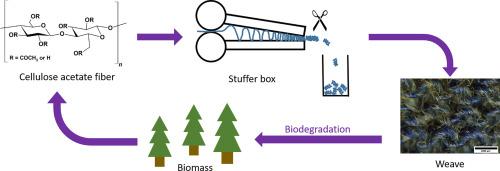用卷曲的醋酸纤维素纤维生产和分离莱赛尔-醋酸纤维素针织物
IF 11.2
1区 环境科学与生态学
Q1 ENGINEERING, ENVIRONMENTAL
引用次数: 0
摘要
醋酸纤维素(CA)可作为纺织品中的聚对苯二甲酸乙二醇酯(PET)替代品,具有生物降解性和机械分解性。纺织纤维的生产假设可以使用过滤巾生产设备。通过环锭纺纱,使用来自滤丝束机的不同卷曲 CA 纤维生产混合 Lyocell-CA 纱线。纱线生产、纤维染色和随后的材料分离(回收率为 88%)均采用标准工艺。50:50 %w/w 的纱线的滴度为∼46 tex(≙ g/1000 m),韧性为∼0.1 N/tex。纱线的韧性随着莱赛尔含量的增加而增加(100% 莱赛尔的韧性为 0.2 N/tex)。此外,还使用丙酮-乙醇混合物(1:2 v/v)将 CA 从分散染料中分离出来。虽然纯 CA 纱线的生产需要改进 CA 纤维的纺丝,但这一工艺可在现有机器上以普通机器设置进行植入。纺织用 CA 纤维可通过过滤丝束基础设施生产。CA 可以帮助减少大气中化石碳的富集。本文章由计算机程序翻译,如有差异,请以英文原文为准。

Production and separation of knitted lyocell-cellulose acetate fabrics from crimped cellulose acetate fibers
Cellulose acetate (CA) can serve as bio-favourable polyethylene terephthalate (PET) substitute in textiles, being biodegradable and mechanically disintegrable. Textile fiber production was hypothesised possible using filter tow production facilities. Different crimped CA fibers from a filter tow machine were used to produce mixed Lyocell-CA yarns via ring spinning. Yarn production, fiber-specific dyeing and subsequent material separation (recovery of 88 %) was possible by standard processes. Yarns of a 50:50 %w/w have a titer of ∼46 tex (≙ g/1000 m) and a tenacity of ∼0.1 N/tex. The yarns show increasing tenacity with increasing lyocell content (∼0.2 N/tex for 100 % Lyocell). Furthermore, CA was separated from dispersion dye using acetone-ethanol mixtures (1:2 v/v). Though ameliorating CA fiber spinning is required for pure CA yarn production, this process is implantable on existing machinery in common machine settings. Textile CA fibers can be produced by filter tow infrastructure. CA can help reducing the atmosphere's fossil-carbon enrichment.
求助全文
通过发布文献求助,成功后即可免费获取论文全文。
去求助
来源期刊

Resources Conservation and Recycling
环境科学-工程:环境
CiteScore
22.90
自引率
6.10%
发文量
625
审稿时长
23 days
期刊介绍:
The journal Resources, Conservation & Recycling welcomes contributions from research, which consider sustainable management and conservation of resources. The journal prioritizes understanding the transformation processes crucial for transitioning toward more sustainable production and consumption systems. It highlights technological, economic, institutional, and policy aspects related to specific resource management practices such as conservation, recycling, and resource substitution, as well as broader strategies like improving resource productivity and restructuring production and consumption patterns.
Contributions may address regional, national, or international scales and can range from individual resources or technologies to entire sectors or systems. Authors are encouraged to explore scientific and methodological issues alongside practical, environmental, and economic implications. However, manuscripts focusing solely on laboratory experiments without discussing their broader implications will not be considered for publication in the journal.
 求助内容:
求助内容: 应助结果提醒方式:
应助结果提醒方式:


